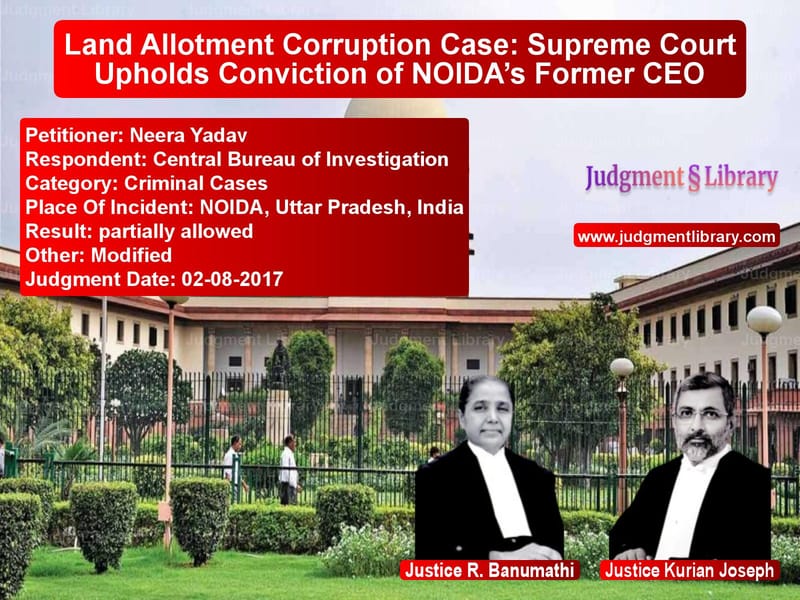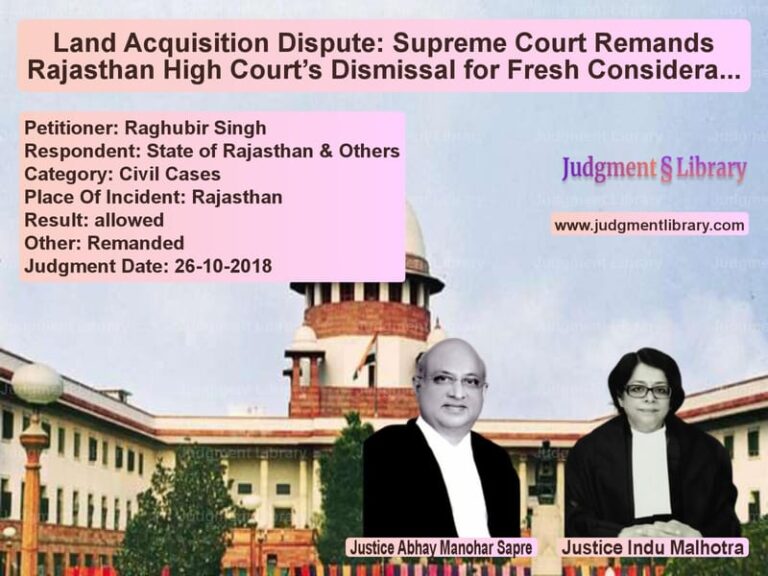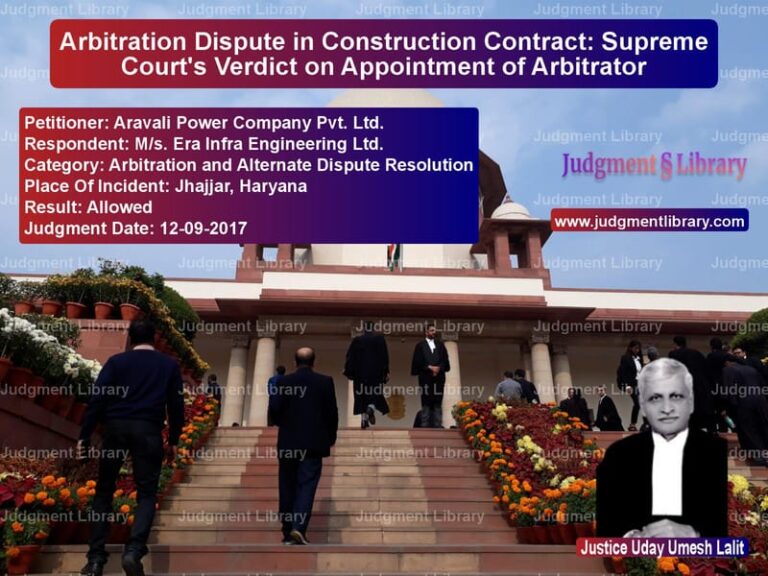Land Allotment Corruption Case: Supreme Court Upholds Conviction of NOIDA’s Former CEO
The case of Neera Yadav v. Central Bureau of Investigation is a landmark judgment addressing corruption in land allotments by public officials. The Supreme Court of India, in this case, upheld the conviction of Neera Yadav, the former Chairperson and Chief Executive Officer (CCEO) of the New Okhla Industrial Development Authority (NOIDA), under the Prevention of Corruption Act, 1988. The case revealed serious irregularities and misuse of official position in allotting land to herself and her family members.
The judgment reaffirms that public servants are accountable for their actions and that corruption in government institutions will not be tolerated. The ruling is significant in setting a precedent against the misuse of public office for personal gain.
Background of the Case
The appellant, Neera Yadav, served as the Chairperson and CEO of NOIDA from January 10, 1994, to November 8, 1995. During her tenure, she was accused of illegally allotting residential plots to herself and her family members by manipulating official records and bypassing standard procedures.
In 1998, the Central Bureau of Investigation (CBI) registered a case against her following a directive from the Supreme Court in response to complaints about land allotment scams. The investigation revealed that Neera Yadav had misused her position to obtain multiple land plots in prime locations at discounted rates, often in violation of allotment rules.
The Special CBI Court in Ghaziabad found her guilty under Section 13(2) read with Section 13(1)(d) of the Prevention of Corruption Act, 1988. She was sentenced to three years of rigorous imprisonment along with a fine of Rs.1,00,000. The High Court of Allahabad upheld the conviction. The present appeal before the Supreme Court challenged the conviction and sentencing.
Key Legal Issues
- Whether Neera Yadav’s actions amounted to an abuse of her official position under the Prevention of Corruption Act.
- Whether the allocation of land to herself and her family members was legally justified.
- Whether the enhancement of plot sizes and other changes in land allotments violated established procedures.
- Whether the punishment imposed was proportionate to the offenses committed.
Arguments by the Petitioner (Neera Yadav)
The petitioner’s counsel contended that:
- The petitioner, as an officer of NOIDA, was eligible to apply for residential land, and her allotment was made in compliance with the applicable rules.
- The conversion of her allotted plot from Sector-32 to Sector-14A was legally approved and followed the due procedure.
- The changes in land allotment and plot enhancements were not made at her behest but were administrative decisions taken by NOIDA’s planning authorities.
- The land allotments made to her daughters were not in violation of rules since they were independent, adult applicants with separate financial resources.
- The conviction was based on procedural irregularities rather than evidence of criminal intent or corruption.
Arguments by the Respondent (CBI)
The Central Bureau of Investigation, representing the prosecution, argued:
- Neera Yadav misused her authority to gain personal benefits, including the allocation of prime plots in NOIDA for herself and her daughters.
- Her application for land allotment was incomplete and should not have been accepted under NOIDA’s established rules.
- She ensured that her own plot size was increased beyond the prescribed limit by manipulating official records and approvals.
- She violated NOIDA’s policy by obtaining plots in different locations for herself and her daughters despite the rule prohibiting multiple allotments to the same family.
- Her conviction was based on clear evidence of favoritism, misuse of power, and violation of public trust.
Supreme Court’s Judgment
The Supreme Court, in its ruling delivered by Justice R. Banumathi and Justice Kurian Joseph, upheld the findings of the lower courts and reaffirmed the conviction of the appellant.
1. Abuse of Official Position
The Court held that Neera Yadav had clearly abused her official position for personal benefit. It noted:
“The conduct of the appellant in obtaining prime land plots, manipulating records, and bypassing established rules constitutes clear abuse of public office. Such actions erode the faith of the public in governance and administration.”
2. Violation of Land Allotment Rules
The Court found that the petitioner had violated NOIDA’s rules by obtaining multiple land allotments for her family and increasing the size of her own plot beyond permissible limits.
“The petitioner’s actions were contrary to public interest. The land allotment rules were meant to ensure fair and equitable distribution of public land, not to benefit a select few through misuse of power.”
3. Public Interest and Fair Play
The Court emphasized that officers in public positions must act with fairness and transparency:
“A public servant is entrusted with authority not for personal enrichment but for serving public interest. Corruption and favoritism in public administration must be strictly dealt with.”
4. Punishment and Sentence
While upholding the conviction, the Court reduced the sentence from three years to two years of rigorous imprisonment considering the passage of time and the fact that the petitioner had surrendered the illegally obtained land.
“Given the circumstances, while the conviction stands, the sentence is reduced to two years of rigorous imprisonment.”
Key Takeaways from the Judgment
- Strict enforcement of anti-corruption laws: The judgment reinforces the principle that corruption by public officials will not be tolerated.
- Land allotment must be transparent: The case sets a precedent for ensuring fairness in government land allocations.
- Public servants must act in public interest: The ruling affirms that officials holding key positions must use their authority responsibly.
- Accountability for misuse of power: The conviction of a senior officer like Neera Yadav sends a strong message that public office cannot be used for personal gain.
Conclusion
The Supreme Court’s judgment in Neera Yadav v. CBI is a significant ruling in the fight against corruption in public administration. By upholding the conviction while slightly reducing the sentence, the Court balanced the need for deterrence against excessive punishment.
The case serves as a reminder that public officials are accountable for their actions and that the misuse of public office for personal benefit will be met with legal consequences. The judgment reinforces the importance of transparency, fairness, and adherence to the rule of law in government operations.
Don’t miss out on the full details! Download the complete judgment in PDF format below and gain valuable insights instantly!
Download Judgment: Neera Yadav vs Central Bureau of In Supreme Court of India Judgment Dated 02-08-2017.pdf
Direct Downlaod Judgment: Direct downlaod this Judgment
See all petitions in Fraud and Forgery
See all petitions in Money Laundering Cases
See all petitions in Extortion and Blackmail
See all petitions in Judgment by R. Banumathi
See all petitions in Judgment by Kurian Joseph
See all petitions in partially allowed
See all petitions in Modified
See all petitions in supreme court of India judgments August 2017
See all petitions in 2017 judgments
See all posts in Criminal Cases Category
See all allowed petitions in Criminal Cases Category
See all Dismissed petitions in Criminal Cases Category
See all partially allowed petitions in Criminal Cases Category







